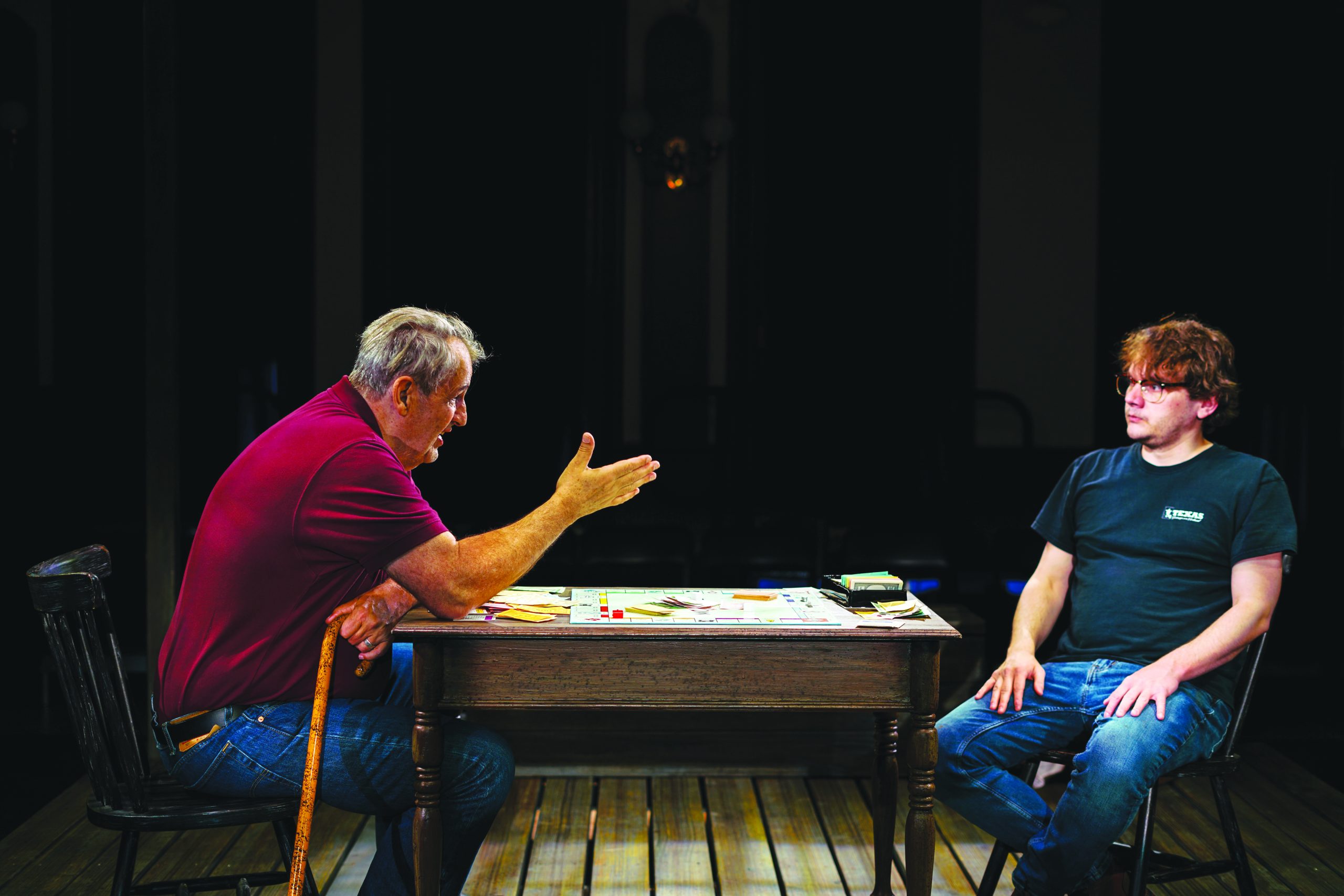
A seemingly innocuous game of Monopoly between father and son unfolds into an exploration of the murky waters of American capitalism in 237 Virginia Avenue.
This darkly comedic play — written by David Myers and produced by Boulder’s Local Theater Company at The Savoy Denver under the direction of Nick Chase and Pesha Rudnick — employs the board game as a metaphor to unravel 400 years of contentious property disputes.
“The ideas expressed through this father-son relationship resemble the cultural divide we see about housing, where older generations could afford property on a single salary and younger generations can’t,” Chase says. “At Local, we always ask, ‘Why this play now?’ We are at this fascinating point in America where we have a group of people who had it easier and a group who are having difficulty acquiring property.”
The story revolves around Eric (Jacob Dresch), a highly educated but underemployed professor who returns to his childhood home to care for his ailing father, Rex (Lawrence Hecht). As they play Monopoly, the two actors break up the action by performing scenes from different eras spanning 400 years, depicting how different generations fought over the same piece of land.
“Monopoly is something everybody is deeply familiar with; it is a version of capitalism we all understand,” Myers explains. “There was also something profound about viewing money as a game with winners and losers. I didn’t intend to write a historical play, but I wanted to include all these details about mortgages and home ownership in each era.”
Laying the foundation
Myers was inspired to write the play after purchasing a home with his father in 2017.
“I have children, so the concept of generations and how the country had changed from when my father was 10 to when I was 10 to when my son was 10 was very present,” he says. “Almost everything in my life changed when I bought a home. I was surprised by how significant it was, but I realized it was because a house is a piece of capital, and I became more connected to the capitalist system than I had ever been.”
Previous workshops helped usher the play into its final form, including a Local Lab Pop-Up in Los Angeles in March 2022 starring John Lithgow and Nate Corddry and at the Durango PlayFest in 2023 with Glenn Morshower and Jack Mikesell. These readings, both directed by Rudnick, helped refine the script’s themes.
“The benefit of workshops is that you get to spend time with the playwright at the table, very close to the page, figuring out the tone,” Rudnick says. “David’s play is a deep dive into what it means to own a home and how your relationship with society changes — that was the first thing that drew me to the script, and it has only gotten stronger.”
Building the play
Co-directors Chase and Rudnick describe the script as a “great challenge” for the creative team because it constantly jumps between centuries and requires the actors to each play five different characters. Fortunately, Rudnick notes that Dresch and Hecht are classically trained and “equally compelling comedic and dramatic performers.”
Hecht, known for his years of theater education at the DCPA’s National Theatre Conservatory and acclaimed performances across the country, has since relocated from Colorado to California and sees this opportunity to work on a new play as a homecoming. As for Dresch, he’s a Henry Award-winning actor who serves as an adjunct theater professor at CU Boulder and Metropolitan State University of Denver.
“This is one of the first times in my acting career that I’ve felt so similar to the character,” Dresch says. “Eric is 34; I’m 35. I am staring down the barrel of an economic system where homeownership seems like a hard needle to thread. Despite following my dreams and excelling academically, career stability is tricky. Also, having a father who has struggled with health issues, particularly since the pandemic, I understand what it is like to be in that generation fighting against those systems.”
Rehearsals for 237 Virginia Avenue have been an intensive collaborative effort, with the playwright himself in an active role. The team says Myers’ hands-on approach helped the actors and directors dive deeply into the characters’ psyches and the complex interplay between historical and contemporary scenes.
The design team, led by Markas Henry, faces the challenge of depicting 400 years of American history on a single set. With sound by CeCe Smith and lighting by Sean Mallary, the atmosphere shifts seamlessly between eras. This approach supports the narrative’s transitions through time and underscores the connections between past and present struggles over property.
“No matter your age, this play will resonate with you as an American,” Dresch says. “People of a certain age will identify with Rex; people of my generation will identify with Eric; and for people younger than me, it’s a wake-up call to what they’ll face when they try to buy a home.”
ON STAGE: 237 Virginia Avenue. May 2-19, The Savoy, 2700 Arapahoe St., Denver. $10-$45
